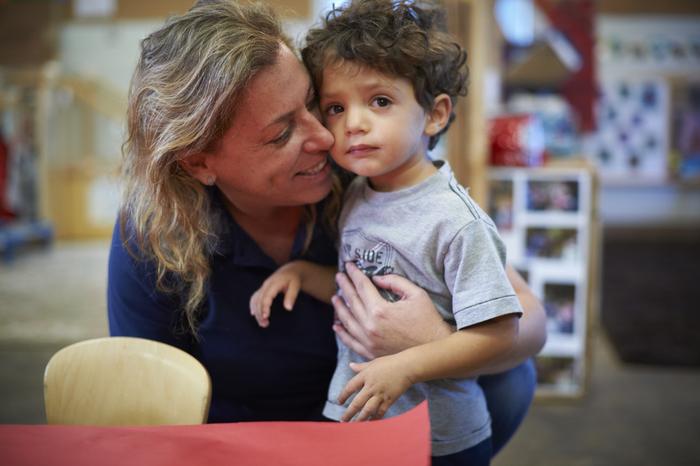Compared to other mammals, human children are dependent on their caregivers for a remarkably long time. Throughout the ages, they have developed “psychological tactics” to endear themselves to adults and thus enhance their chances of survival. This prolonged dependency is believed to have driven the evolution of complex signaling mechanisms to help infants attract and maintain adult attention.

Credit: Florida Atlantic University
Compared to other mammals, human children are dependent on their caregivers for a remarkably long time. Throughout the ages, they have developed “psychological tactics” to endear themselves to adults and thus enhance their chances of survival. This prolonged dependency is believed to have driven the evolution of complex signaling mechanisms to help infants attract and maintain adult attention.
As babies grow, their methods of communication evolve from simple cries and facial expressions to more sophisticated vocal and cognitive cues.
Research has shown that when children are young, adults are drawn to certain signs of immaturity in their voices and thoughts, which help them understand what the children need. A key question that has not been thoroughly studied is how caregivers weigh a child’s vocal versus cognitive cues during early childhood. For instance, if a child’s voice sounds immature but their reasoning is advanced, which aspect influences caregivers more?
To address this, researchers from Florida Atlantic University and Universitat I Jaume in Spain, examined how adults interpret these signals and the dynamics between different types of cues such as facial expressions, voices and cognitive signals.
Researchers created two main scenarios: one where a child’s vocal and cognitive cues matched (a consistent condition) and another where they did not (an inconsistent condition). For example, in a consistent condition, a child might show an immature voice and magical thinking, where they believe their thoughts or actions can unrealistically affect the world. In contrast, an inconsistent condition might feature a child with a mature reasoning but an immature-sounding voice.
Study participants listened to recordings of children talking while researchers examined how they responded to these children. They focused on two types of signs: how the children’s voices sounded and the way they reasoned.
Results of the study, published in the journal Evolution and Human Behavior, found that adults are more attentive to children’s voices when assessing their happiness or helplessness. However, when evaluating a child’s intelligence (related to magical thinking) or negative emotions (associated with natural thinking), adults focus more on the content of what the child says rather than the tone of their voice.
“When vocal and cognitive cues matched, children with immature voices and magical thinking were seen as more helpless, while those with mature voices and logical reasoning were viewed as more intelligent and less needy,” said David Bjorklund, Ph.D., co-author, associate chair and professor, Department of Psychology within FAU’s Charles E. Schmidt College of Science. “When cues conflicted, adults relied more on vocal signals, especially for assessing emotions and helplessness. This shows how vocal signals heavily influence emotional judgments and perceived care needs, reflecting the evolved ways children use these cues to elicit care.”
During infancy, children do not use language, so caregivers rely heavily on facial and vocal cues to gauge their needs and emotions. For instance, a baby’s cry or facial expression can signal hunger or discomfort, helping caregivers respond appropriately.
Interestingly, when evaluating intelligence, adults appeared to rely more on cognitive cues rather than vocal ones. For children expressing natural thinking, the maturity of their reasoning was particularly influential in judgments about their intelligence. However, this was not always the case. For supernatural or magical reasoning, the influence of cognitive and vocal cues was more mixed, suggesting that the interplay between these signals can vary based on the context.
“Our research shows that while facial expressions remain important, they are less effective in conveying certain types of information compared to vocal and cognitive signals,” said Bjorklund. “Understanding these dynamics can improve our grasp of caregiver-child interactions and inform approaches to support both children and caregivers.”
Study co-authors are Carlos Hernández Blasi, Ph.D.; Sonia Agut, Ph.D.; Franciso Lozano Nomdedeu, Ph.D.; and Miguel Ángel Martínez, Ph.D., all with the Department of Psychology within the Universitat I Jaume.
– FAU –
About Florida Atlantic University:
Florida Atlantic University, established in 1961, officially opened its doors in 1964 as the fifth public university in Florida. Today, the University serves more than 30,000 undergraduate and graduate students across six campuses located along the southeast Florida coast. In recent years, the University has doubled its research expenditures and outpaced its peers in student achievement rates. Through the coexistence of access and excellence, FAU embodies an innovative model where traditional achievement gaps vanish. FAU is designated a Hispanic-serving institution, ranked as a top public university by U.S. News & World Report and a High Research Activity institution by the Carnegie Foundation for the Advancement of Teaching. For more information, visit www.fau.edu.
Journal
Evolution and Human Behavior
Method of Research
Observational study
Subject of Research
People
Article Title
Children’s evolved cues to promote caregiving: Are voices more powerful than thoughts in signaling young children’s attributes and needs to adults?
Article Publication Date
18-Jul-2024



